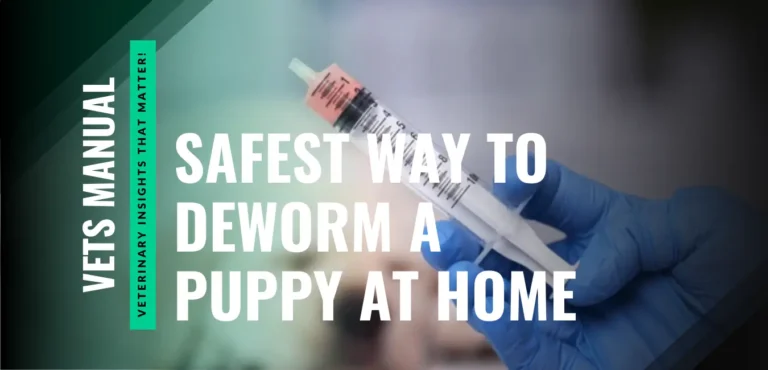If you are raising a puppy, you already know they are bundles of joy, energy, and endless curiosity. But there is also one not-so-cute part, “worms.” These little parasites are extremely common in puppies and you have to keep your puppy free of them. But if they arrive, what is the safest way to deworm a puppy at home?
Worms can cause everything from fever in dogs to bloated belly or even life-threatening complications if not addressed early. The good news is, with a little care and some trusted knowledge, you can safely deworm your puppy at home without risking their health.
As a veterinarian, I have helped countless pet owners navigate this process safely. In this guide, I have explained everything you need to know to do it right.
Puppies are particularly vulnerable to intestinal worms like roundworms, hookworms, and tapeworms. These parasites do not just cause discomfort. They can seriously affect growth, nutrition, and immunity.
Most puppies acquire worms from their mothers, either in utero or through nursing. Some get infected from the environment, especially if they are exploring outdoor areas or interacting with other dogs.
Recognizing the importance of early and effective deworming is the first step toward keeping your little one healed.
There are so many types of worms which are commonly present in the puppies and you have to understand their behaviors. In this way, you can determine what is the right treatment approach.
Below is a short overview of the common types of worms in puppies:
- Roundworms are the most common in puppies. They can cause a pot-bellied appearance, diarrhea, and vomiting. In severe cases, they can even migrate through organs.
- Hookworms attach to the intestinal lining and feed on blood. It can lead to anemia, weakness, and pale gums. Puppies with heavy infestations may deteriorate quickly.
- Tapeworms are flat, segmented parasites usually transmitted through fleas. You may see rice-like segments near your puppy’s anus or in their stool.
- Whipworms are less common in very young puppies but can still cause issues. They live in the large intestine and can lead to weight loss and diarrhea.
Understanding which worm your puppy has helps you choose the most effective treatment. But even if you are unsure, broad-spectrum dewormers can safely target multiple types.
Timing is everything when it comes to deworming. Puppies grow rapidly, and even a short-term infestation can lead to developmental setbacks. You may notice your dog shaking its head or is having fever. That’s why early and repeated deworming is crucial during the first few months of life.
Deworming Schedule for Puppies
I always recommend following a structured timeline for deworming. Here is what I advise most pet parents to stick with for best results.
| Puppy Age | Deworming Action |
|---|---|
| 2 weeks | First deworming dose |
| 4 weeks | Second deworming dose |
| 6 weeks | Third deworming dose |
| 8 weeks | Fourth deworming dose |
| Every month (until 6 months) | Continue monthly deworming (i.e., at 12, 16, 20, and 24 weeks) |
| After 6 months of age | Shift to deworming once every 3 months (quarterly), or as advised by your veterinarian |
The first deworming should occur at 2 weeks of age, followed by additional doses at 4, 6, and 8 weeks. After that, monthly deworming should continue until the puppy is at least 6 months old. From there, shifting to quarterly deworming is usually sufficient unless your vet suggests otherwise based on lifestyle or risk exposure.
This schedule is not just about removing existing worms. It is also about preventing reinfection, which is quite common in growing pups.

Now that we have covered the what and when, let’s get into how to deworm a puppy at home. Home deworming can be safe and effective when done correctly. However, choosing the wrong medication, dosage, or approach can create more harm than good.
1. Choose the Right Deworming Medication
Not all dewormers are created equal. There are three broad types:
- Oral tablets
- Liquid suspensions
- Chewable treats
Each has pros and cons, but what matters most is the active ingredient and its effectiveness against the specific worms.
For roundworms and hookworms, pyrantel pamoate is commonly used and very safe for young puppies. For broader coverage, medications like fenbendazole, milbemycin oxime, or febantel may be more appropriate.
You can find many of these dewormers over the counter, but make sure to check the label and dosage instructions carefully. Some brands even offer combination treatments that also prevent fleas and heartworms, but these are usually prescription-only.
2. Administer the Dewormer Correctly
Once you have got the right product, administration is the next critical step. Liquid dewormers can be mixed with food or given directly using a syringe. Chewables and tablets should be hidden in a treat or soft food if your puppy is picky.
Always give the full dose, even if your puppy seems hesitant at first. Missing even a portion of the dose can reduce effectiveness and allow worms to linger.
If your puppy vomits shortly after taking the medication, consult your vet, as it may be necessary to re-administer or switch products.
3. Consult a Veterinarian for Guidance
Even if you plan to deworm at home, I always recommend getting your vet’s input first. A simple stool test can confirm what type of worms your puppy has and guide your medication choice. Vets can also calculate the exact dosage based on your puppy’s weight and age, which is essential for safety.
If you have recently adopted your puppy or are not sure about their medical history, do not skip this step. It gives you a clear strategy and ensures your puppy’s system is ready to handle the dewormer.
Deworming does not end with the last dose. Monitoring your puppy for signs of improvement or potential side effects is an important part of the process.
1. Signs the Dewormer Is Working
After successful deworming, you might notice dead worms in your puppy’s stool. This is a good sign. You should also see improvement in energy levels, appetite, coat condition, and digestion over the next several days.
Puppies who were lethargic or had a pot belly often bounce back quickly. If symptoms persist or worsen, it may indicate a heavy worm burden or another underlying issue that needs veterinary attention.
2. Possible Side Effects to Watch For
Most modern dewormers are very safe, especially those recommended by vets. However, some puppies may experience mild side effects like temporary diarrhea, vomiting, or a slight drop in energy for a day or two.
If your puppy shows signs of severe reactions such as persistent vomiting, intestinal blockage, drooling, muscle tremors, or difficulty breathing, seek emergency veterinary care immediately. These reactions are rare but must be taken seriously.
Deworming is just the first step. If you want to keep your puppy worm-free, consistent home care is key. Parasite eggs can live in the environment for weeks, which makes reinfection a real possibility, for all dog breeds, whether you posses English Cream Golden Retriever, Czech GSD, or Labrador.
So, you have to implement the following tips in your home to ensure prevention of re-infestation.
1. Clean Living Environment
Always clean up your puppy’s feces immediately and disinfect the area with pet-safe cleaners. Wash bedding, toys, and food bowls regularly. If your puppy spends time outdoors, limit their access to areas where other animals defecate.
Also, consider using flea prevention, especially if you are dealing with tapeworms. Fleas act as intermediate hosts and can easily restart the cycle.
2. Good Hygiene for Everyone at Home
Remember, some types of worms can be transmitted to humans. Make sure everyone in your household washes their hands after handling the puppy, especially children. Avoid letting your puppy lick your face or sleep in your bed during deworming days.
I often get asked if there are natural deworming options. While some home remedies like pumpkin seeds or ground papaya have mild antiparasitic effects, they are not substitutes for proper dewormers.
Natural methods are unpredictable, unregulated, and not backed by sufficient veterinary research. Worse, relying solely on these can delay effective treatment and put your puppy at serious risk.
If you are interested in complementary options, you can discuss integrating them with your vet’s advice, but never skip the main medication.
Even if everything seems to be going well, I recommend a follow-up vet visit about two weeks after deworming. It allows your vet to confirm that the worms are fully cleared and decide whether another dose or fecal exam is needed.
Recurring symptoms or signs of worms after multiple treatments can indicate resistance or reinfection, which might require a different strategy.
Deworming your puppy at home can be both safe and effective, but it requires the right knowledge, preparation, and follow-through. As a veterinarian, I encourage pet owners to stay informed and proactive rather than taking chances with over-the-counter meds or vague advice from the internet.
Always consult your vet before starting any treatment, monitor your pup closely, and maintain a clean environment. Remember, a healthy puppy is a happy puppy, and that journey begins with proper parasite control.
If you are building a wellness routine, don’t forget to include vaccinations and flea control alongside deworming.
